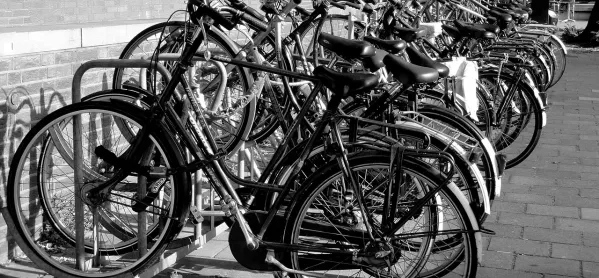There are a myriad of obvious anti-social behaviours that a campaigning headteacher might wish to crack down on to improve the life of a school and its surrounding environment. Ending chewing gum being disgorged in the school yard or shoplifting from the local newsagents, for example, might target behaviour from a hard core of offenders that would make life noticeably better for both the school and its local community.
Targeting cyclists, on the other hand, seems an unusual approach. Yet a number of heads are attempting to ban this mild-mannered cohort through making cycling into school too restrictive to bother pedalling. The latest prohibition has been imposed at Stanley Park High School in Carshalton, South London, where pupils now need to display a school issue number plate to bring their bikes into school. The school justified the move on safety grounds. They will probably succeed in this goal - what could be safer than being driven to school by a parent? Having to register and somehow attach that number to the bicycle while feeling like a reprobate means that many pupils will choose the easier option of getting a lift in a warm, comfortable car in the morning.
This school is only the latest to make the restrictions on cycling to school so tough as to almost create a de facto ban. A school in St Albans decided to ban pupils who don’t wear a helmet (it’s not against the law) from locking their bikes in school grounds and a school in Nottingham demands that cycling pupils cannot leave school until all those on foot have left the premises. These cyclists are being treated like the away fans at a football game where there are fears it could all kick off.
Schools’ ‘draconian measures against cyclists’
It makes you wonder why these draconian measures have been imposed on an activity that promotes healthy living and a concern for the environment. Have these heads had to sit in traffic jams on their way to work while bikes scoot past them on either side on one too many mornings? Any school that clumsily tries to discourage rather than encourage cycling is making a grave error.
Over the years, I have worked with a large number of pupils to encourage them into cycling; from the basics of teaching them how to ride a bike, to helping them to source a cheap set of wheels, to cycling with them as they plan their best route into school from home. And while the general benefits of cycling might focus on the environment or health, for these pupils it is the independence that cycling brings. Pupils who cycle to school are not attached to parents or bus timetables but have the freedom to travel as they please, not just into school but to visit friends or go into the country. There are other benefits of cycling: a school in Glasgow had a bicycle loan scheme to allow pupils to get to school quickly and safely passing through rival gang territories.
Unfortunately, battle lines have been drawn up between cyclists and non-cyclists, and the positive benefits of the activity are being ignored. I fear new, more ingenious ways for other schools to attempt to ban cycling without actually admitting that they are banning cycling: the wearing of lycra shall not be allowed on school premises. Talking about Geraint Thomas is strictly forbidden. Respecting the environment should not extend to doing anything about it.
Gordon Cairns is a teacher of English in Scotland




